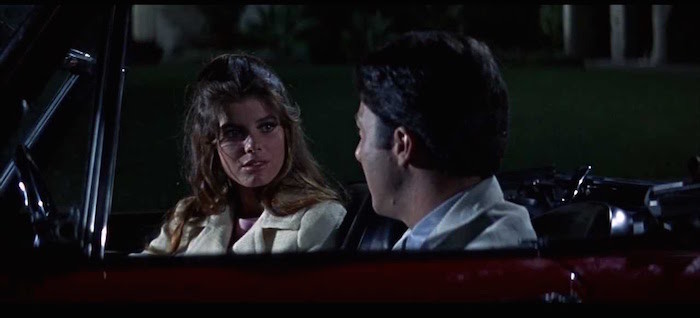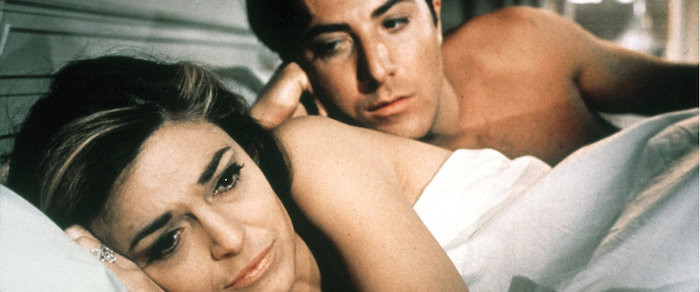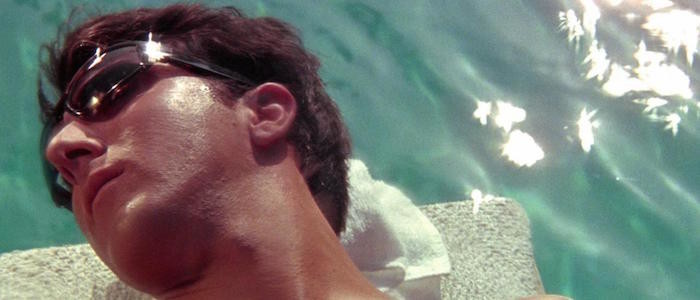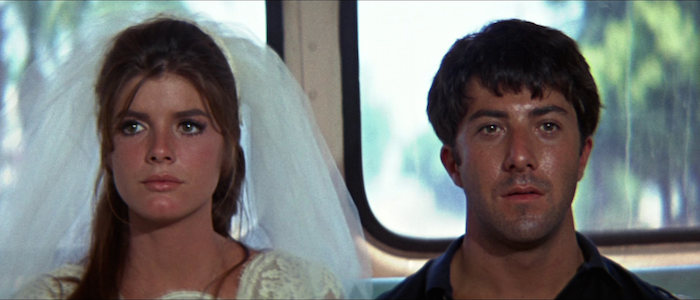50 Years Later, 'The Graduate' Still Speaks To Everyone – By Saying Nothing
When The Graduate opened in theaters on December 22, 1967, it was quickly branded a generation-defining movie. Twentysomething audiences responded rapturously to the movie's portrayal of postgrad malaise and uncertainty, as well as its firm rejection of their parents' suburban ambitions. (Why get married and get a job in "plastics" when you can run out of the wedding chapel and onto a school bus heading literally anywhere else?) The Graduate became a surprise box office blockbuster that year and launched the career of its young star, Dustin Hoffman.But baby boomers weren't the only ones to claim Benjamin Braddock as their own. The Graduate director Mike Nichols and screenwriter Buck Henry identified with Ben, even though they were approaching 40. Gen X and millennial moviegoers have also connected with the story in subsequent decades, lending the 50-year-old movie a certain timelessness. How has The Graduate managed to speak to so many people? In the new book Seduced by Mrs. Robinson, author Beverly Gray argues that The Graduate achieved this universal, classic status by deliberately avoiding a major topic of its era: the turbulent politics of the late 1960s.
Disappearing Soldiers and DPs
Seduced by Mrs. Robinson chronicles the development, production, release, and legacy of The Graduate – and it suggests that in earlier drafts, the movie's script was more political. According to Gray, an early version of Henry's screenplay included a scene between Ben and a former high school acquaintance, who has been drafted to serve in the Vietnam War. The soldier is jealous of Ben's flashy convertible and angry that he was denied the same opportunities. "If it weren't for the dumb guys like us, the smart guys like you would have to go," he complains. "The way I look at it is: it's a case of all the dumb guys making the country safe for all of the smart guys." There's an ensuing conversation about duty and patriotism. Ben thinks he should just desert, his former peer feels his fate is inevitable.The scene obviously didn't make it into the final film, much to the annoyance of some viewers. When Nichols toured college campuses to promote The Graduate ahead of its 1967 release, Vietnam was a hot topic of conversation. Nichols claims that 80% of the post-screening questions were about the war. "There was no way to be current, no way to be a student, if you didn't feel very deeply about Vietnam," he said, many years later. "The fact that the movie wasn't about Vietnam seemed to them sort of vulgar, self-concerned, not what they wanted. Until it opened, and then they totally turned around because it was an experience of theirs."The movie's lack of social commentary also cost them a cinematographer. Haskell Wexler was Mike Nichols' first choice for director of photography. The two had worked together on Who's Afraid of Virginia Woolf? and nearly did again on The Graduate. But Gray reports that "Wexler overtly disliked what he saw as Buck Henry's frivolous script" and walked away from the project to find something more in line with his political beliefs. He settled on In the Heat of the Night, the movie that would later beat The Graduate for Best Picture at the Academy Awards.
Bargaining with Berkeley
Another interesting anecdote from Gray's book concerns the production team's failed attempts to film on the UC Berkeley campus. Berkeley is significant to the Graduate script. It's where the object of Ben's affections, Elaine Robinson, attends college and it's also where he attempts to win her back after she discovers his affair with her mother.Nichols lobbied hard for permission to shoot on the actual campus. According to Gray, he even roped in a Paramount executive and former alum to sweet talk the school chancellor. This exec apparently referenced student unrest on campus as part of his pitch. "The intended beauty of color photography would place the University in a better light contrasted with the hours of newsreels recording only Sather Gate Plaza," he wrote in a letter that Gray cites. "Berkeley would appear as the stable, respectable, educational community it is."These references to the Free Speech Movement demonstrations that dominated the campus in 1964 did not sway the chancellor. Nichols had to use the University of Southern California as a Berkeley stand-in instead. One of the film's few nods to student protests actually occurs at this faux Berkeley. When Ben seeks a room at a boarding house near the campus, the landlord asks if he's "one of those outside agitators." Luckily, Ben isn't, because the landlord "won't stand for it."Although The Graduate would receive near universal acclaim from film critics in 1967, this skittishness around — and, in the case of Berkeley, exploitation of — youth in revolt would earn it some detractors. One turned out to be the most influential critic of her time.
The Reviews Are In
Most of the original Graduate reviews were glowing. Bosley Crowther of The New York Times raved: "Funny, outrageous, and touching, The Graduate is a sophisticated film that puts Mr. Nichols and his associates on a level with any of the best satirists working abroad today." Stanley Kauffmann at The New Republic wrote that, "All of the talents involved in The Graduate make it soar brightly above its shortcomings and, for reasons given, make it a milestone in American film history." Several more praised the movie's wit, performances, and unique edits.But a select few critics were less enthusiastic. The most important one was Pauline Kael, who eviscerated The Graduate in her now-famous essay "Trash, Art, and the Movies." She wrote, "The Graduate only wants to succeed and that's fundamentally what's wrong with it." Kael thought it was "corny American" and couldn't believe young, hip audiences were falling for its "slick" entertainment that sold "youthful narcissism." She continued, "How could you convince them that a movie that sells innocence is a very commercial piece of work when they're so clearly in the market to buy innocence?"Kael was the most famous voice to pan The Graduate, but she wasn't the only one. Stephen Farber and Estelle Changas at Film Quarterly also seemed to think young people were being sold safe, empty art. "We expected a lot," they wrote. "We're young, and so is Nichols; in addition to youth, he has money, talent, intelligence, irreverence. And after a lot of quickie exploitation films about teenyboppers and acidheads, The Graduate might have been the first movie about today's youth to tell it like it is. But Nichols has too much at stake to risk involving us. He's adored because he's hip and safe at the same time; his audiences know that they won't go too far."These reviews indicate a small school of critics who thought The Graduate could've better spoken to actual Ben Braddocks in 1967 by being bolder and blunter. At least one young man felt cheated. Political activist Mark Rudd, a leader of the 1968 Columbia University protests and the radical organization Weather Underground, was just 20 when The Graduate debuted. He apparently failed to see any of his life in the film, telling Gray, "Here's an alienated kid who graduated and didn't know what he was doing. Well, we weren't alienated anymore. We were beyond alienation."
Cool Contemporaries
If The Graduate was reluctant to embrace issues plaguing the class of 1967, what did a movie that wasn't reluctant look like? Kael likely would have pointed to Bonnie and Clyde, which was released four months before The Graduate. Kael led the charge in championing Bonnie and Clyde as the face of New Hollywood. She praised its revolutionary use of violence and the subsequent discomfort it caused for audiences. Kael also argued that the movie was, crucially, "contemporary in feeling," that it was articulating long-held but seldom-expressed thoughts. She even managed to reference the Vietnam draft when praising Bonnie and Clyde's pointed use of 1930s nostalgia, writing, "In the American experience, the miseries of the Depression are funny in the way that the Army is funny to draftees — a shared catastrophe, a leveling, forming part of our common background."There's also In the Heat of the Night, the film that cost The Graduate several Oscars and its original DP. The movie arrived in the middle of the civil rights movement and featured a scene where a white man slaps Detective Virgil Tibbs (Sidney Poitier) only to get slapped right back. This and other scenes were so provocative for the time that, in order to get the movie greenlit, producer Walter Mirisch had to prove the film would still make money even if it didn't open in any Southern cities. Poitier was also keenly aware of the movie's potency. He initially refused to film anywhere below the Mason-Dixon line, only reluctantly agreeing to limited shoots in Tennessee.But interestingly, The Graduate's own production designer, Richard Sylbert, offered up a totally different movie from DP Haskell Wexler for comparison. Gray notes that Sylbert believed The Graduate was revolutionary in its own way. In an interview with Wide Angle, Sylbert said he viewed Ben as a "passive version" of the revolt he saw in the 1960s. But when pressed for a movie that portrayed a more active version of that revolt, he mentioned Medium Cool. Wexler didn't just do the cinematography for this 1969 film; he also wrote and directed it. It's a blend of documentary footage and fictionalized story concerning the 1968 Democratic National Convention, one that literally captures youthful protesters rioting in the streets. Wexler, a liberal activist and antiwar veteran, saw the movie as his opportunity to capture "all the ferment that was going on at that time."Another example is Easy Rider, which opened not quite two years after The Graduate. Easy Rider was seen as a true counterculture movie, one so open about drug use that the actors supposedly smoked real weed on film. It featured aimless bikers, hippie communes, brothels, violence, and literal explosions. Gray notes that some UCLA grads of the era preferred it over The Graduate for showing "how society judges based on not who you are but how you are."
Why ‘The Graduate’ Endures
The lack of political focus or social commentary earned The Graduate some criticism upon its original release and later into its legacy. But as Gray demonstrates, this muddied approach actually ensured the film's longevity. Because Benjamin Braddock's feelings of alienation are so vague, they do not belong to a particular time or place. They belong to the students of 1967 and 2017 alike.Movie critic and baby boomer David Ansen may have observed it best when he wrote in Newsweek, "Part of the secret of its phenomenal success was that Benjamin – who expresses no political opinions, never mentions any of the issues of the day, indeed barely speaks for the first (and best) half of the movie – was a blank slate upon which an entire generation was free to project its self-image. Like Benjamin, we weren't all sure what we wanted, but we knew what we didn't want: 'plastics.'"The Graduate was able to speak to everyone by essentially saying nothing, and that's why we're still talking about it 50 years later.
